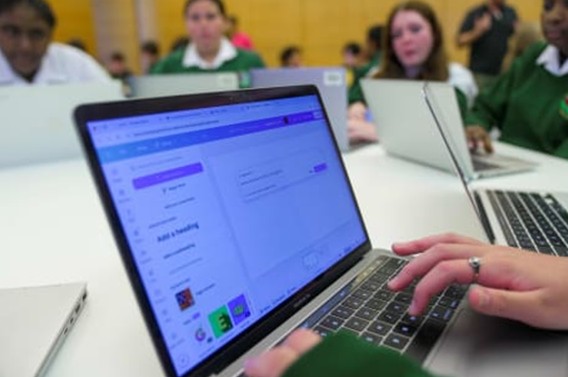
Reports show that automation could impact up to 1.3 million Australian jobs by 2030, putting pressure on schools to ensure young people are equipped with the digital skills they will need to thrive in the future workforce.
In a bid to prepare the next generation for this seismic shift, Day of AI Australia – an annual event dedicated to educating students and educators about Artificial Intelligence – has joined forces with UNSW Sydney to roll out a free, hands-on AI education program for students and teachers nationwide.
The initiative, which focuses on building AI literacy from the ground up, provides free foundational AI literacy programs to students in Years 1 to 10. Since launching in partnership with UNSW in 2022, the program has reached more than 100,000 students nationwide.
Leading the charge is Dr Jake Renzella, Director of Studies in Computer Science and Co-Head of the Computing and Education research group at UNSW. Currently, he and his team are designing immersive, real-world AI learning experiences tailored for classrooms across the country.
‘Teacher PD is core to our approach’
When asked what specific skills or understandings teachers and school leaders will gain from the Day of AI professional development that they aren’t getting from their existing PD, Dr Renzella pointed to the program’s unique focus on practical, future-focused learning experiences that go beyond theory and directly support classroom implementation.
“Teacher professional development is core to our approach in delivering AI Literacy to hundreds of thousands of Aussie school kids around the country,” Dr Renzella told The Educator.
“The Google.org funding will enable us to scale existing initiatives including teacher PD, incursions for low-ICSEA schools and device donations.”
Dr Renzella said the project supported by Google.org will see UNSW develop several “safe, scaffolded, hands-on Generative AI experiences.”
“These games will complement existing Day of AI Australia lessons and take the curriculum out of the abstract, and into teachers’ and students’ hands,” he said.
“In 2024 we delivered Teacher PD sessions in partnership with UNSW, Questacon and SA Department for Education. In 2025 we are expanding the number of sessions we will provide in terms 3 and 4, thanks to our partnership with Microsoft and this additional support from Google.org.”
Helping to bridge the digital divide
Dr Renzella said Australian school leaders will be supported to lead AI literacy initiatives across their staff and curriculum teams, beyond just teacher training sessions.
“Day of AI Australia is working with some of our existing partners like Microsoft to develop a series of teacher and school leader/administrator lessons to support schools better understand and integrate AI where appropriate,” he said.
“With the support of Officeworks and TDM Growth Partners, Day of AI Australia have run a device program for government schools since 2022. This Google.org funding will help us expand the device donation program, to provide schools and students with laptops that need them most.”
Dr Renzella said the key focus is on “scalable, direct to classroom offerings.”
“Day of AI Australia does encourage and support communities of practice together with some of our partners, including Questacon,” he said.
“We want to meet teachers where they are – there are already amazing networks and communities that we hope to tap into further to provide AI literacy for teachers and school leaders.”
‘Working towards a fairer, more innovative future’
Google.org Australia’s Senior Program Manager, Marie Efstathiou, said Day of AI Australia’s work alongside UNSW proves how generative AI can be “a game-changer” for tackling some of Australia’s biggest social challenges.
“These programs are about actively working towards a fairer and more innovative future for everyone, and by equipping Australian students and teachers with essential AI skills and hands-on experiences, they are directly boosting confidence and addressing the need for AI literacy in a rapidly evolving world,” she said.
“We are proud to support their efforts to prepare the next generation to not only understand AI, but to actively leverage it for positive change.”

